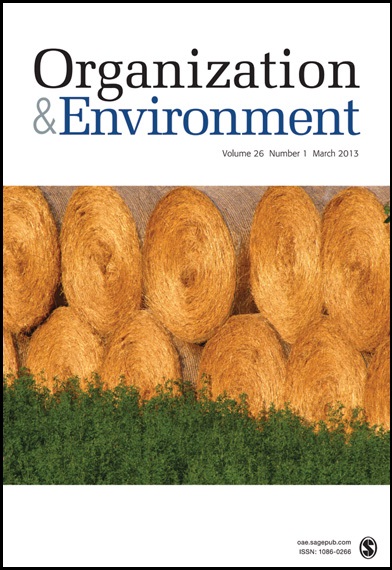Optimizing Performance Management Systems in the Energy Sector
 [We’re pleased to welcome Rui Vieira of University of Amsterdam. Rui recently published an article in Organization & Environment, entitled “Aligning Strategy and Performance Management Systems: The Case of the Wind-Farm Industry” with co-authors Brendan O’Dwyer of University of Amsterdam and Roman Schneider of University of Minho.]
[We’re pleased to welcome Rui Vieira of University of Amsterdam. Rui recently published an article in Organization & Environment, entitled “Aligning Strategy and Performance Management Systems: The Case of the Wind-Farm Industry” with co-authors Brendan O’Dwyer of University of Amsterdam and Roman Schneider of University of Minho.]
This article presents a case study examining the problems and possibilities of performance management in a wind-farm company. Drawing on Ferreira and Otley’s (2009) recently developed performance management systems (PMSs) framework, the study demonstrates how the framework facilitates in-depth, holistic and critical evaluations of existing PMSs, and, how these evaluations can drive the development of revised PMSs which balance economic, social and environmental goals. This integrated focus on PMS evaluation and design is unique as prior work seeking to develop systems to promote and measure sustainable performance tends to establish them in isolation from informed evaluations of existing systems. Drawing on the case analysis, the article proposes a form of ‘sustainable balanced scorecard’ to enable a company to streamline their management decision-making. It also offers guidance for companies on the development of PMSs which can contribute to their survival and growth in a wind energy sector characterized by increasing competition.
An excerpt from the paper:
We conduct a case study using the Ferreira and Otley (2009) framework applied to a German windfarm company. The article makes three contributions to the literature. First, our integrated focus on PMS evaluation and design is unique as, quite often, earlier work seeking to develop systems to promote and measure sustainable performance establishes them in isolation, independent of evaluations of existing systems (Hubbard, 2009; Lohman, Fortuin, & Wouters, 2004). To our knowledge, this is the first study that uses the Ferreira and Otley (2009) framework explicitly to evaluate a company’s existing PMSs as part of a project aimed at designing a revised PMS. The study also mobilizes Broadbent and Laughlin’s (2009) extension to the Ferreira and Otley framework (2009) in order to place additional analytical emphasis on the organizational context within which a PMS is evaluated and designed. Particular attention is given to contextual factors that affect the nature of PMSs in an effort to also offer a better understanding of the interaction between the design and use of PMSs (Agostino & Arnaboldi, 2012; Henri, 2006). Second, the article offers lessons for companies operating in the wind-energy sector (and more widely) with respect to how they might develop their PMSs to help ensure their continued growth and survival. This is important given the need for wind-farm companies to avoid complacency, as the poor design of PMSs will have far-reaching implications if and when widely predicted increased competition is introduced into the wind-farm sector. Third, we draw on the results of our analysis of the wind-farm company’s existing PMSs to propose a form of “Sustainable Balanced Scorecard” (SBSC) to enable the company to streamline their management decision-making. This proposal adopts an approach that is similar to Hubbard’s (2009) SBSC, which added nonmarket (social and environmental) elements to the traditional BSC. Unlike Hubbard (2009), however, in our development of an SBSC we do not encourage a narrow focus on a single metric. Its aim is to ensure that the selected performance measures fully reflect the organization’s wider stakeholders and strategic value drivers and are consistent with the vision and goals of the organization, thereby increasing the visibility of its critical functions. Furthermore, we argue that Ferreira and Otley’s (2009) framework can also be used in other situations in which the need to achieve a balance between economic, environmental, and social objectives is required, like the “Responsive Scorecard” (Van der Woerd & Van den Brink, 2004).
You can read “Aligning Strategy and Performance Management Systems: The Case of the Wind-Farm Industry” from Organization & Environment free for the next two weeks by clicking here. Want to know all about the latest research from Organization & Environment? Click here to sign up for e-alerts!
During the month of April, you can access 1.5 million article across SAGE Publishing’s 940+ journals for free–how? Sign up here for free trial access!
*Wind farm image attributed to warrenski (CC)
Rui Vieira is assistant professor of Management Control and Accounting at the University of Amsterdam Business School, The Netherlands and visiting scholar at Instituto de Empresa Business School, Spain and Nordakademie, Germany. He received his PhD in Industrial and Business Studies from the University of Warwick. Rui’s research interests in management accounting are interdisciplinary and qualitative in focus, covering the fields of management control systems, cost accounting, performance measurement, and their organizational and behavioral aspects.
Brendan O’Dwyer is professor of accounting at the University of Amsterdam Business School. He is also the director of the Amsterdam Business School Research Institute. Previously he was head of the Accounting division at the School. Brendan’s research interests are interdisciplinary and qualitative in focus. His academic work has been published in leading international accounting and management journals such as Accounting, Organizations and Society, Contemporary Accounting Research, The European Accounting Review and The Journal of Business Ethics.
Roman Schneider has been Managing Director of many wind companies in German and Poland for many years. He received his diploma in economics from the Hochschule fuer Oekonomie, Berlin, and his MBA from the Nordakademie, Elmshorn. He is currently a PhD student in Entrepreneurial Sciences (Accounting) at the Universidade do Minho, Portugal, and teaches management accounting and financial controlling in the adult education. His research focuses on management control systems and performance measurement in businesses.































































































